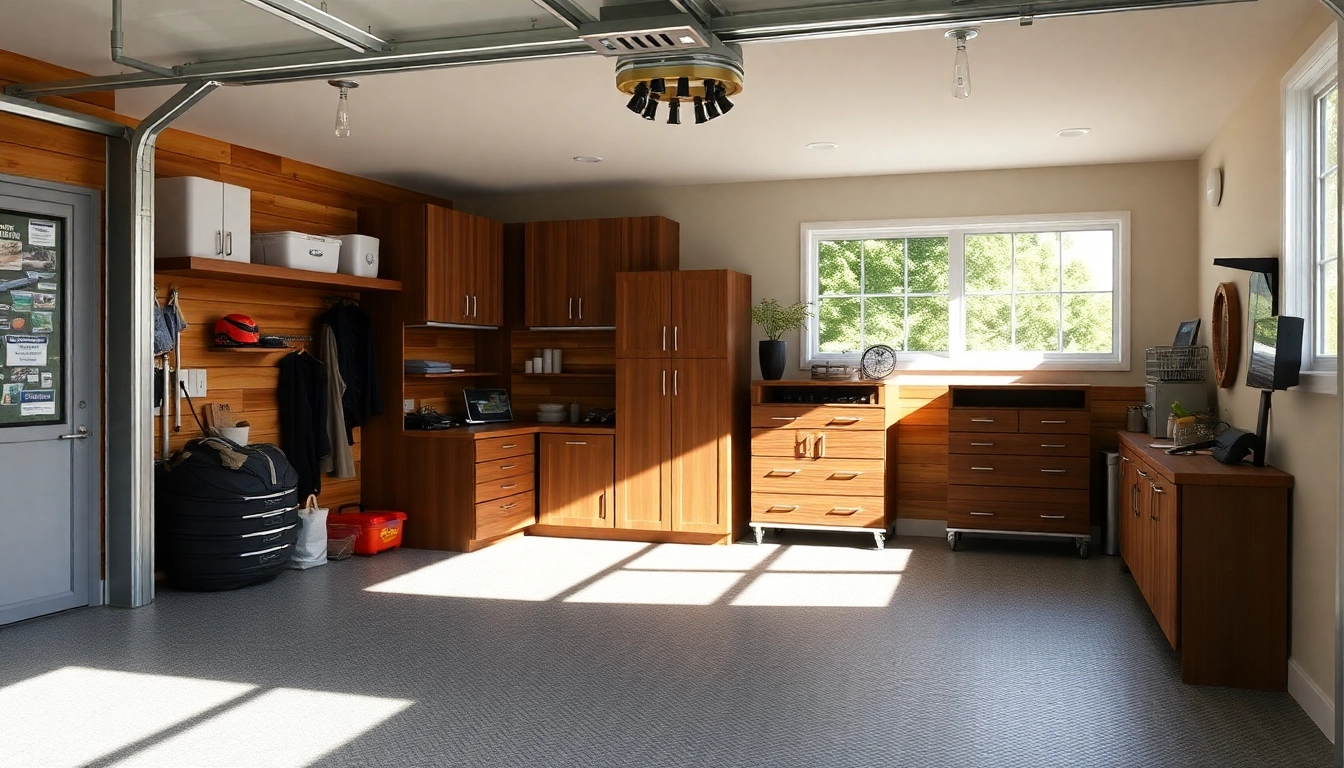Understanding Custom Garages
In recent years, the concept of custom garages has gained popularity among homeowners seeking more than just a place to park their vehicles. Custom garages are designed not only to serve traditional functions but also to fulfill unique lifestyle needs, whether it’s for hobbies, storage, or as a creative workspace. This article will delve into the various aspects of custom garages, helping you understand their significance, advantages, planning, materials, designs, and maintenance.
What Are Custom Garages?
Custom garages are tailored structures built according to the specific desires and requirements of the homeowner. Unlike standard garages, custom options allow for personalization in design, size, and functionality. This means that whether you have a classic car collection, need additional storage space, or want a workshop, you can craft a garage that meets all your specifications.
Benefits of Custom Garages
The benefits of opting for a custom garage are numerous:
- Personalization: Homeowners can design a garage that reflects their style and complements their home’s architecture.
- Increased Property Value: A well-designed custom garage can enhance the overall value of the property.
- Optimized Space: Efficient use of space for vehicles, storage, or recreational activities is a significant advantage.
- Enhanced Functionality: A garage can serve multiple purposes beyond vehicle storage, including workshops, home gyms, or entertainment spaces.
Key Features to Consider
When planning your custom garage project, consider the following key features:
- Size: Determine how many vehicles you want to store and any additional space for storage or work areas.
- Architecture: Align the style of your garage with your home’s aesthetic for a cohesive look.
- Materials: Choose materials that will be durable and complement your home’s exterior.
- Functional Elements: Consider features like windows for natural light, insulation for climate control, and specific flooring suited to your needs.
Planning Your Custom Garage Project
Budgeting for Your Custom Garage
Budgeting is a crucial step when planning a custom garage project. Factors influencing cost include size, materials, design complexity, and any additional features like electrical work or plumbing. Typically, the cost can range significantly, from thousands to tens of thousands of dollars. It’s advisable to establish a clear budget early on to guide your decisions and help avoid overspending.
Choosing the Right Location
The location of your garage can impact its utility. Here are some aspects to ponder when selecting a location:
- Proximity to Home: The garage should be conveniently located for easy access.
- Sunlight Exposure: Consider how the sun affects the garage, planning for shade or sunlight as your needs dictate.
- Land Use Regulations: Familiarize yourself with local zoning laws and property lines.
Design Considerations and Styles
Garage design should not only focus on aesthetics but also on practicality. Some popular styles include:
- Traditional: Gabled roofs with wooden siding for a classic look.
- Modern: Sleek designs with flat roofs and large windows for ample natural light.
- Farmhouse: Invokes rustic charm with wood features and spacious interiors.
Exploring various styles can aid in deciding what fits seamlessly with your home.
Materials and Construction Options
Popular Materials for Custom Garages
The choice of materials affects not only the aesthetics of your garage but also its durability and maintenance needs. Common materials used include:
- Wood: Offers a classic look but requires regular maintenance.
- Metal: Steel structures are durable, require less maintenance, and can be available in various colors and finishes.
- Vinyl: Provides flexibility in styles and is resistant to fading and weathering.
Understanding Construction Methods
The construction method chosen for your garage will affect the timeline and cost of completion. Key methods include:
- Stick-Built: Traditional framing technique; allows for flexibility in design.
- Pre-Fabricated Kits: Convenient and usually cost-effective, but with limited customization options.
- Modular Construction: Built in sections off-site and assembled on your property; offers a balance between custom design and efficient construction.
Eco-Friendly Options for Custom Garages
As sustainability becomes increasingly important, many homeowners look for eco-friendly materials and design strategies. Consider:
- Sustainable Materials: Use recycled or sustainably sourced materials when possible.
- Energy Efficient Designs: Incorporate natural light through larger windows and skylights, and consider solar panels to supplement energy needs.
- Green Landscaping: Position your garage with effective drainage and landscaping that aids in water management.
Custom Garage Designs for Different Needs
Garage Designs for Car Enthusiasts
Car enthusiasts often desire functional, spacious garages that facilitate their passion. Important considerations include:
- Multiple Vehicle Capacity: Ensure enough space for multiple cars, including parking and maneuvering space.
- Workshop Zones: Dedicate areas for working on vehicles, equipped with the necessary tools and storage.
- Climate Control: Ensure your garage has heating and cooling systems to protect sensitive car finishes.
Functional Storage Custom Garages
For those needing extra storage, custom garages can be optimized to accommodate various items efficiently. Tips include:
- Built-in Storage Solutions: Shelving, cabinets, and pegboards to organize tools and outdoor equipment.
- Vertical Storage: Use vertical space to maximize storage capacity, such as overhead racks.
- Climate Considerations: Ensure ventilation and moisture control for sensitive items stored within the garage.
Multi-Use Spaces: Garages with Added Functionality
Custom garages can also serve multiple functions beyond traditional storage. You can design your garage space to act as:
- Home Office: An inspiring workspace insulated from the home noise.
- Exercise Area: Customizable space for cardiovascular and strength training equipment.
- Creative Studio: A dedicated area for hobbies like painting or woodworking, equipped with essential facilities.
Maintaining Your Custom Garage
Routine Maintenance Tips
Proper maintenance ensures longevity and functionality. Key maintenance activities include:
- Regular Inspections: Check for signs of wear and tear, particularly on doors, windows, and floors.
- Cleansing: Maintain cleanliness by regularly removing dust and debris, especially if the space also serves as a workshop.
- Weatherproofing: Ensure seals and insulation are intact to prevent moisture intrusion.
Upgrades and Renovations for Longevity
Considering future upgrades can enhance your garage’s functionality over time. Think about:
- Flooring Upgrades: Invest in sturdy and resilient flooring solutions, such as epoxy coatings, for increased durability and aesthetic appeal.
- Lighting Enhancements: Upgrade to energy-efficient LED lighting options to improve visibility and workspace ambiance.
- Smart Technologies: Install smart garage opener systems that provide enhanced security and convenience.
Maximizing Space and Organization
Organization tools play a vital role in maximizing the utility of your garage. Consider implementing:
- Storage Shelves: Create wall-mounted shelving units to free up floor space.
- Magnetic Tool Strips: Keep tools visible and accessible with magnetic strips for ease of access.
- Labeling Systems: Labeling bins or sections can streamline the process of locating items quickly.



